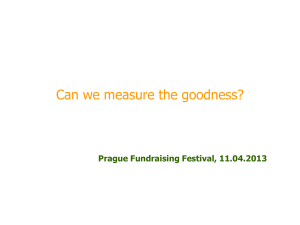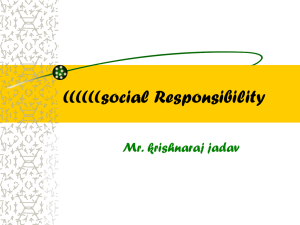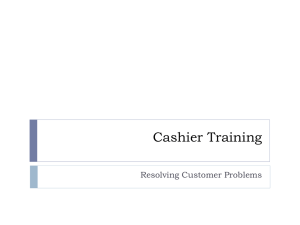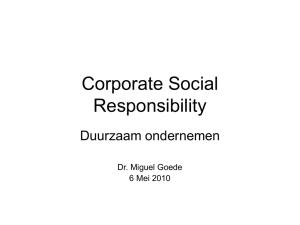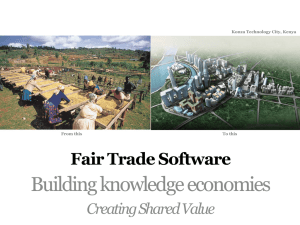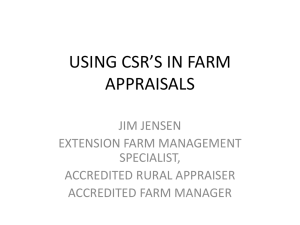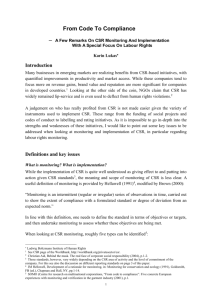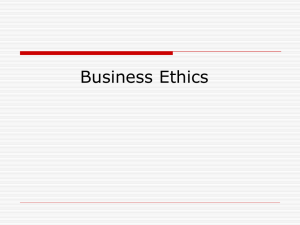Presentation - Agricultural Economics
advertisement
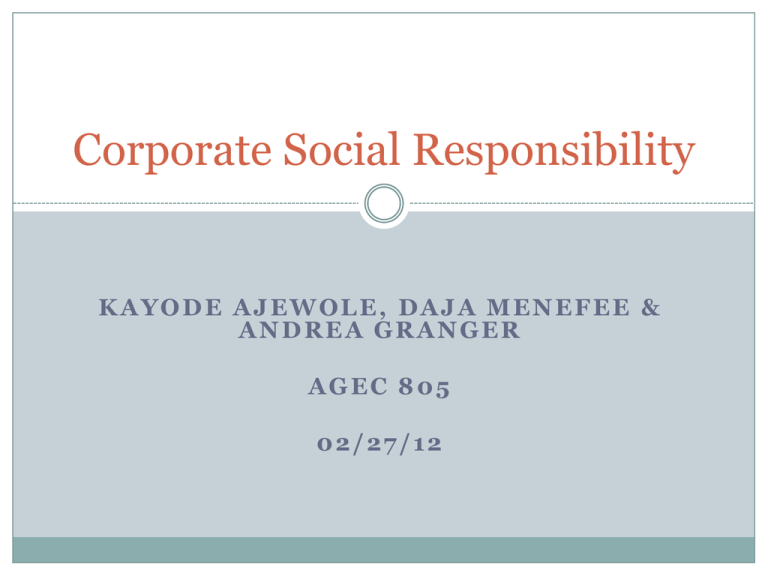
Corporate Social Responsibility KAYODE AJEWOLE, DAJA MENEFEE & ANDREA GRANGER AGEC 805 02/27/12 Reviewed Literature Dahlsrud, A. (2008), How corporate social responsibility is defined: an analysis of 37 Definitions. Corporate Social Responsibility and Environmental Management, 15: 1–13. Maloni, M. J., & Brown, M. E. (2006). Corporate social responsibility in the supply chain: An application in the food industry. Journal of Business Ethics, 68(1), 35–52. Martinez, Steve W. (2007). The U.S. Food Marketing System: Recent Developments, 1997-2006. U.S. Dept. of Agriculture, Econ. Res. Serv., ERR-42. Outline Corporate Social Responsibility Framework I. Defining Corporate Social Responsibility What does CSR look like? Three perspectives on CSR What makes up CSR I. II. III. IV. Dimensions II. I. II. III. IV. V. VI. VII. VIII. III. IV. V. Animal welfare Biotechnology Environment Community Fair Trade Labor and Human Rights Health and Safety Procurement Social License Conclusion CSR Innovator Defining Corporate Social Responsibility CSR has evolved over the last 50 years Several different phrases used with CSR All interpretations very similar, made up of similar dimensions Is there need for a universal definition? What does it look like? “Good For You, Good For the Community, Good for the Planet” – ConAgra “Creating Shared Value” – Nestle “Nourishing our Consumers, Nourishing our Neighbors, Nourishing our Employees, Nourishing our Planet” – Campbell Soup Ethical, Local, Global – Starbucks Food with Integrity – Chipotle Three perspectives on Corporate Social Responsibility Dahslrud – CSR is a phenomenon/social construction that should be understood and adapted to company strategies rather than defined. Martinez – CSR is a differentiation strategy and a social movement that surfaces in five stages. Maloni – CSR is an extended measure of corporate performance beyond traditional economic and legal considerations and should include ethical and discretionary responsibilities unique to each firm. What makes up CSR? 8 dimensions (Maloni, 2006 ) Dimensions: Animal Welfare What consumers want: Better information about welfare practices of their food products Especially relevant to food industry Consumers perceive higher levels of animal welfare as an indicator for higher food safety and quality Consumer WTP is higher for improved animal welfare conditions (Bennett et al., 2002). Dimensions: Biotechnology What consumers want: Improved trust/more information about food products Public awareness of genetically modified food in the US is increasing Concern: moral/ethical stances, cross- contamination, growth hormone affects on animals, and over all food safety concerns. Considerable threat to food retailers, need to create trust soon Dimensions: Environment What consumers want: More environmentally-conscious firms One of the more common dimensions of CSR Environmentally friendly products for consumers as well as responsible environmental care practices in supply chains Led by the emergence of organic food products Case Study CHIPOTLE Back to the Start Commercial CHIPOTLE Dimensions: Community Pasi et al (2011) believe that a socially responsible company must maintain his local market presence which includes: Physical Presence – Diversity of local production and assortment Cultural Responsibility – Local history and food traditions Dimensions: Community This dimension also includes... Educational support Economic development Job training Employee volunteering Health care Literacy Child care Housing E.t.c Dimensions: Fair Trade Fair Trade is a set of business practices Voluntarily adopted by the producers and buyers of agricultural commodities and handmade crafts that are designated to advance many economic, social and environmental goals (equal exchange, 2012) Dimensions: Fair Trade Raising and stabilizing the incomes of small scale farmers, farm workers and artisans More equitably distributing the economic gains Promoting safe and sustainable farming methods working with conditions Connecting consumers and producers Promoting labor rights Increasing consumer awareness and engagement with issues affecting producers Dimensions: Fair Trade Barriers to Fair trade Limited store promotion Fragmented supply markets Reluctant and unaware consumers Cost Restricted product range Verification Dimensions: Human Rights & Labor Food supplies involve manual, strenuous, and dangerous agricultural labor work characterized by: Low pay Labor migration Labor oversupply Child labor Poor working conditions Dimensions: Human Rights & Labor Agricultural child labor – The beverage industries example In the Ivory Coast, an estimated 200,000 children are victims of labor abuse in Cocoa production. Case Study The Hershey and McDonald Intervention In February 2012, The Hershey company pledged $10 million over the next five years to educate West African Cocoa farmers on improving their trade and combating child labor. (CNN) Ronald McDonald’s house provides housing for families of sick children (Smith, 1994) Dimensions: Procurement Any behavior/activity that leads to unfair conditions between buyers and sellers. Including: Favoritism Bribery Obscure contract terms Rebidding past deadlines Dimensions: Health & Safety It is vital for companies to address consumers’ concerns regarding the industry’s capability to identify problems early in the supply chain before products reach the retail level. These issues include: Traceability Food security Product labeling Healthier offerings Tyson CSR Statement: “Through its Core Values, Code of Conduct, and Team Member Bill of Rights, Tyson strives to operate with integrity and trust and is committed to creating value for its shareholders, customers and Team Members. The company also strives to be faith-friendly, provide a safe work environment and serve as stewards of the animals, land and environment entrusted to it.” Social License Social License - The benefit a company gain from a community as a reward of social responsibility practices. Falls best into the community dimension Conclusion No need for a Corporate Social Responsibility definition Dynamic and adaptable Measurable success How to be a CSR Innovator The Five Elements of the Best CSR Programs Forbes Magazine April 2011 1. Business-based social purpose 2. Clear theory of change 3. Quality and depth of information 4. Concentrated effort 5. Partnering with experts



